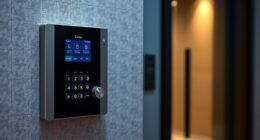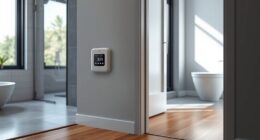A home security system works by combining various electronic devices that protect your property from threats like burglary and fire. Sensors on doors and windows detect unauthorized access, while motion sensors track unusual movements. When triggered, these devices alert the control panel, which activates alarms or notifies monitoring centers. You can opt for professional monitoring for 24/7 surveillance or self-monitoring via mobile apps for real-time updates. With wireless technology, installation is simple and allows for remote access. To better understand how these systems can enhance your safety, consider exploring the different components and options available.
Key Takeaways
- Home security systems utilize sensors, cameras, and alarms to monitor and protect against unauthorized access and environmental hazards.
- Entry and motion sensors detect unusual activity, triggering alerts to the control panel or mobile devices.
- Wireless communication allows for easy installation and remote access to monitor and control the system via smartphone apps.
- Professional monitoring provides 24/7 surveillance and quick emergency response, while self-monitoring allows homeowners to manage alerts in real-time.
Definition of Home Security Systems
A home security system is a set of electronic devices designed to protect your residence from threats like burglary, fire, and environmental hazards. These systems typically include a combination of alarms, sensors, and monitoring devices that work together to keep you safe. When you invest in home security, you're taking a proactive approach to safeguarding your property and loved ones.
With DIY home security systems available, you can customize your setup based on your specific needs. You might choose features like smart home security integrations, which allow you to control your system remotely via smartphone apps. This level of monitoring provides not just convenience but also peace of mind, knowing you can stay informed about your home's security status at all times.
Research shows that having visible security systems, including burglar alarms, can deter about 60% of potential intruders. Additionally, homes without security measures are three times more likely to be targeted by burglars. By understanding the definition and purpose of home security systems, you can make an informed decision about the protection you want for your space.
Key Components of Security Systems

Understanding the key components of security systems is essential for creating an effective home protection strategy that meets your specific needs. Here are three significant elements you'll want to take into account:
- Entry Sensors: These devices monitor doors and windows for unauthorized access, sending mobile alerts whenever a breach occurs.
- Motion Sensors: Utilizing infrared technology, motion sensors detect unusual movement in monitored areas and can trigger floodlights or security cameras to enhance your security.
- Security Cameras: These cameras, along with video doorbells, offer real-time monitoring and recording capabilities, allowing you to view and communicate with visitors while deterring potential intruders.
Incorporating additional components like glass-break sensors can further enhance your system. These sensors detect the sound of breaking glass and immediately alert you to potential breaches.
Floodlights, often motion-activated, illuminate dark areas to deter intruders and can integrate with cameras for added security.
With these key components, you can create a robust security system that not only monitors your home but also provides peace of mind through real-time monitoring and mobile alerts.
Functionality and Detection Methods

Home security systems rely on a range of sensors to detect unauthorized access and unusual movement, ensuring your property stays safe and monitored. These sensors include entryway, motion, and glass-break types, each designed to alert you when something's amiss.
When a sensor is triggered, it sends an alert to the control panel, which can activate alarms or notify you and the monitoring center, depending on your system's configuration.
Motion sensors use infrared technology to detect body heat, effectively minimizing false alarms by distinguishing between human movement and pets.
Security cameras enhance your system's functionality by providing real-time video feeds, allowing you to see what's happening around your home. Many cameras also feature motion detection, triggering notifications to your device when activity is detected.
With remote access capabilities, you can monitor your property from anywhere, receiving alerts directly to your mobile app. This means you're always connected and can take immediate action if needed.
Monitoring Options and Response

Two primary monitoring options are available for your security system: professional monitoring for 24/7 surveillance and self-monitoring that puts you in charge of alerts and responses. Each option offers unique benefits to suit your needs.
- Professional Monitoring: You'll have access to dedicated monitoring services that can quickly contact emergency responders when an alarm is triggered. This option enhances your peace of mind, knowing help is just a call away.
- Self-Monitored Home Security: You control notifications and alerts directly through your mobile app. This method allows you to respond to events in real-time without incurring monthly fees.
- False Alarms: Professional services often include verification processes to minimize false alarms, ensuring that emergency responders are only contacted when necessary.
Choosing between these options depends on your lifestyle and comfort level. With professional monitoring, you gain a safety net that offers quicker emergency responses.
Alternatively, self-monitoring can be ideal if you prefer hands-on management of your security alerts. Ultimately, both options help secure your home and provide the peace of mind you deserve.
Wireless Communication and Integration

Wireless communication in security systems allows for easy installation and flexibility, enabling you to place devices anywhere in your home without the hassle of wiring.
Wireless home security systems utilize radio frequencies and Wi-Fi to connect devices, ensuring you can quickly set up your security network. For added reliability, you might consider cellular systems, which maintain consistent communication even when Wi-Fi signals falter.
With remote access through mobile apps, you can monitor your security system in real-time, receive alerts about potential issues, and control devices from anywhere. This capability enhances your peace of mind, knowing you're always connected.
Integration with smart home ecosystems further elevates your experience, allowing you to manage everything—from lights to thermostats—through a single interface.
Many systems also offer cloud storage for video footage, so you can access, review, and share recordings securely, no matter where you are.
This combination of features maximizes your home's security while providing flexible installation options that fit your lifestyle.
Fundamentally, wireless communication and integration create an all-encompassing, user-friendly security solution tailored to your needs.
Advantages and Disadvantages of Systems

When considering home security systems, you'll find both significant benefits and some drawbacks.
While they can deter crime and provide peace of mind, the costs and potential privacy concerns can't be ignored.
It's crucial to weigh these factors to determine what fits your needs best.
Crime Deterrence Benefits
A well-installed security system can considerably deter crime, making your home three times less likely to be targeted by burglars compared to those without such measures. Here are three key benefits of having a security system in place:
- Visible Security Features: The mere presence of alarm systems and cameras acts as a strong deterrent. Research shows that 60% of burglars are discouraged by visible security measures, prompting them to abandon their plans.
- Professional Monitoring: With professional monitoring, your home benefits from rapid emergency response. If an alarm triggers, authorities are contacted promptly, enhancing your safety and peace of mind.
- Environmental Sensors: These sensors can detect unusual activity around entry points, adding another layer of crime deterrence.
While security systems work effectively to prevent crime, be mindful of potential false alarms. They can lead to penalties for professional monitoring services and may cause complacency if not managed properly.
Cost and Maintenance Issues
While security systems greatly enhance safety, understanding the cost and maintenance issues associated with them is essential for homeowners.
The initial cost of a security system can range from $400 to $1,000, depending on whether you opt for a professionally installed system or a more budget-friendly DIY system. On top of that, you'll typically face a monthly fee for monitoring services, which can vary from $10 to over $60.
Maintenance is another important factor to take into account. Wireless components require routine maintenance and battery replacements to function properly, potentially leading to additional costs. Furthermore, false alarms can't only disrupt your peace of mind but may also incur fines from local authorities, further increasing your expenses.
On a positive note, equipping your home with a security system might lead to savings on insurance premiums, as many insurers provide discounts for homes with such systems.
Weighing these costs and maintenance requirements against the benefits will help you make an informed decision about whether a security system is right for you.
Privacy and Security Concerns
Home security systems can greatly enhance your privacy by enabling remote monitoring, but they also raise significant concerns about surveillance and the privacy rights of your guests and neighbors. Here are a few points to reflect on:
- Surveillance Impact: While security cameras deter crime, they can make people feel uncomfortable, as they may feel constantly watched in shared spaces.
- Data Vulnerabilities: Despite encryption, data breaches can occur, leading to unauthorized access to your camera feeds and recorded footage.
- False Alarms: These can strain community resources and lead to unnecessary police responses, creating tension between homeowners and law enforcement.
When you invest in home security systems, you're looking for peace of mind, but the balance between security and privacy is delicate.
The presence of cameras can enhance your security, but at the cost of monitoring the behaviors of those around you. Additionally, if your system falls victim to cyberattacks, sensitive information could be compromised.
It's essential to weigh these privacy concerns against the benefits of enhanced security and to implement robust cybersecurity practices to protect your data and maintain trust.
Frequently Asked Questions
What Is Required for a Home Security System?
To set up a home security system, you'll need a central hub, entryway and motion sensors, security cameras, and a siren. Don't forget a reliable power source and a smartphone for remote monitoring.
Do Home Security Systems Really Deter Burglars?
Yes, home security systems really deter burglars. When they see alarms, cameras, or yard signs, they're more likely to abandon their plans. You're considerably less likely to be targeted with these visible security measures in place.
Do Home Security Systems Work Without Wifi?
Yes, home security systems can work without Wi-Fi. They often use cellular communication, battery power, or wired connections, ensuring you stay protected even during internet outages or in areas with unstable Wi-Fi signals.
What Happens When a Home Security System Goes Off?
When your home security system goes off, it activates alarms, notifies you instantly, and may alert authorities if needed. You'll receive updates, and cameras may capture footage to help assess the situation effectively.
Conclusion
In the end, investing in a home security system isn't just about protection; it's about peace of mind.
When you think of your home as your sanctuary, wouldn't you want to safeguard it against unforeseen threats?
With the right components and monitoring options, you can create a fortress tailored to your needs.
Ultimately, the choice isn't merely about security; it's about ensuring that your loved ones feel safe and sound within their own walls.









